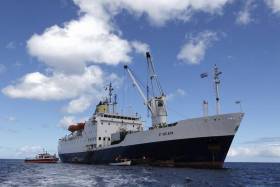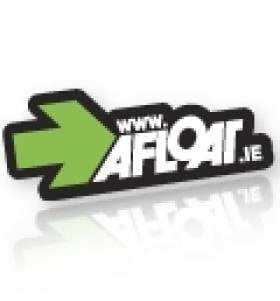Displaying items by tag: sold
Former RMS St. Helena to Become Anti-Piracy Armory Vessel
#Ports&Shipping- The UK's last working postal ship, RMS St. Helena, was for nearly three decades the main source of contact between one of humanity’s remotest islands and the outside world.
Now the ship, cherished by the 4,500 residents of British-ruled St. Helena, will according to MarineLink, start a new life as a floating armory, packed with automatic weapons, bullet-proof jackets and night vision goggles, all stored for maritime security operatives.
Renamed the MNG Tahiti, the 340-foot ship will undergo some tweaks before sailing to the Gulf of Oman where it will be used to ferry guns and guards to passing vessels navigating stretches of water lurking with pirates, its new operator said on Tuesday.
For more on the story click here and Afloat's reportage in recent years from London where RMS St. Helena made a first and only farewell call to the UK capital. In addition to highlighting a previous historic once-off 'charter-cruise' to Irish ports in 1995.
Boats are Selling - Get Your Boat Sold on Afloat.ie
#BOATS FOR SALE – In spite of the doom and gloom boats are still selling through Afloat and we've had good news from one customer this week who sold his yacht within a few weeks of the advert going up on the Afloat boats for sale site.
Cork sailor Ian Travers advertised his Quarter Ton yacht Bandit in May for €11,500 and we received a letter yesterday telling us the deal was done and his yacht was sold. Well done to Ian and we look forward to seeing him and the new owners of Bandit on the water in 2012!
Here's Ian's note which maybe of interest to those considering selling over the winter lay up period.
Dear Afloat,Just a quick note to let you know I have sold my Quarter Tonner 'Bandit'.
I am sure you will be glad to know I received loads of interest from the online advertisement I placed with Afloat.
As soon as the ad was placed, I started receiving enquiries from people who saw her on your website.
Categorically she would not have sold as quick had I not advertised with afloat.ie.
I would now be grateful if you could list the boat as being sold.
Thank you for your efficient service and I would not hessitate in recommending your service to anyone wishing to sell their boat.
Kind Regards,
Ian Travers
To advertise (€10) on Afloat's boats for sale website click here






























































